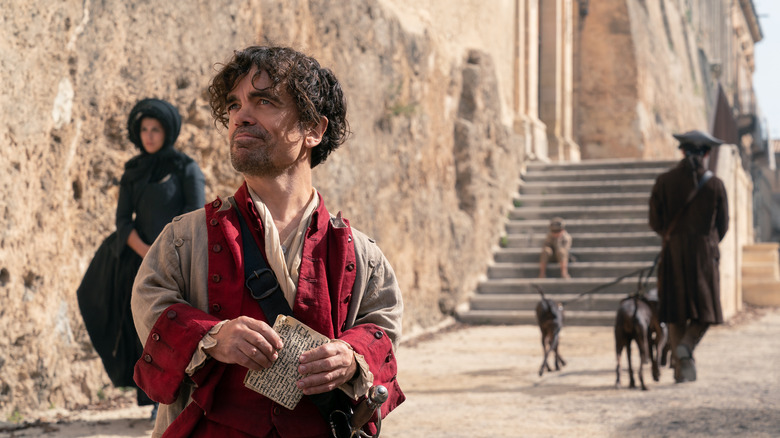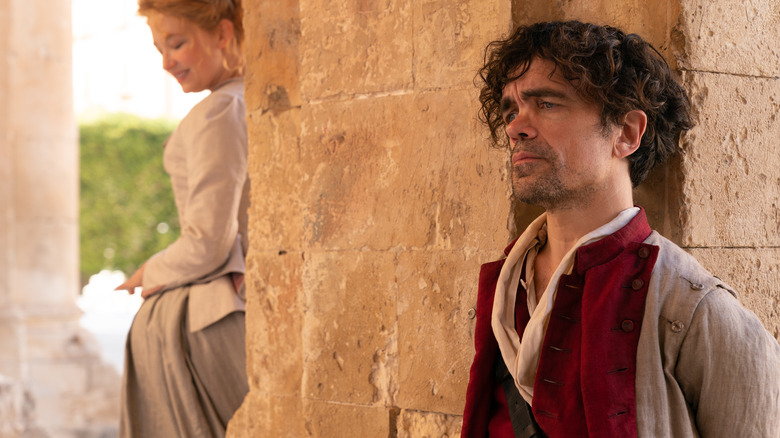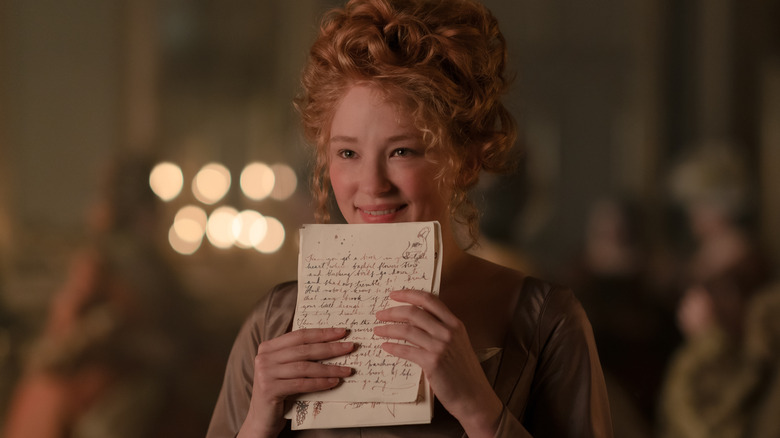How Cyrano Evolved From A Sparse Connecticut Stage Show To A Sprawling Sicily-Set Movie [Exclusive]
Musicalizing Edmond Rostand's 1897 play "Cyrano de Bergerac" is no novel idea — but cutting Cyrano's infamous nose may be a daring creative choice. Stage director and playwright Erica Schmidt was well acquainted with the "Cyrano" musicals when she adapted Rostand's work into her 10-actor stage musical at the Chester, Connecticut Goodspeed Theatre for a 2018 run. With music by Aaron Dessner and Bryce Dessner and lyrics by Matt Berninger and Carin Besser of the indie band The National, the production starred her husband Peter Dinklage as the sharp-witted but lovelorn Cyrano who loves the poetry-loving Roxanne, played by Haley Bennett.
Schmidt's cinematic direction to the stage attracted "Atonement" director Joe Wright, who was moved by the original Connecticut run, to pursue a stage-to-film translation of her work where Bennett (Wright's life partner) and Dinklage reprise their respective stage roles for the screens. An adaptation of her own play script, "Cyrano" became Schmidt's first major screenplay credit. I saw the play's New York 2019 run at the off-Broadway Daryl Roth Theatre that starred Dinklage, and struck a conversation with screenwriter Erica Schmidt on translating the play to the screen, and what she added and restored. (Warning: spoilers ahead.)
Set in the 1640s, the film follows the duelist and poet Cyrano, who loves Roxanne, his dearest friend, from afar and is deathly frightened of rejection for his looks. His chance to express his love seemingly arrives when he learns that the handsome soldier Christian (Kelvin Harrison Jr.) and Roxanne share a mutual attraction. So he devises a ruse with Christian where he ghostwrites the latter's love letters to Roxanne. But the prolonged ruse only keeps Roxanne away from her true romantic wishes as well as Cyrano from his own happiness.
In Schmidt's original play script, her 1640s-set "Cyrano" is "more modern than period." She said, "[Joe] liked that I taken the story out of Paris, France, but he wanted it to be baroque and set it in a fantasy of a period with corsets and swords." Whereas her theatre approach is spare (due to musical underscoring) with a barebones backdrop, the "Anna Karenina" director naturally goes for the grand and sets the tale against a painterly tableau and lush Sicilian architecture as "he wanted it to kinda return to much more verbose version Rostand had," Schmidt added.
'Cutting the nose'
In Rostand's original play, Cyrano derides his own nose for 32 lines, a litany of savage self-insults. To him, it's the bulging bulbous barrier between any possible romance with Roxanne — there's a reason why Cyrano movie adaptations frequent the "Best Fake Nose" movie lists.
Schmidt's idea was "cutting the nose" in her stage adaptation even if "the nose" is still referenced in part, when Dinklage's stage-Cyrano declares, "I'm no fool. What woman could love me with this, this — nose?" However, Schmidt's theatrical take doesn't really have the literally ugly nose, traditionally a prosthetic worn by actors like Steve Martin or José Ferrer in other adaptations.
The stage version left Cyrano's insecurities open to interpretation to make a universal point. "I wanted to not tell what is it that makes him feel physically unlovable," Schmidt said, explaining that the actual nose line onstage amplified the adaptational irony in the eyes of average theatregoers. "You would kind of think there's nothing wrong with the nose and [his insecurities] would be left to interpretation to that space that happens between the audience and the actor in the theater," Schmidt said.
Dinklage has achondroplasia, a form of dwarfism, and stands 4 foot 5 inches. While that specificity may stand out to the average audience, Schmidt noted that, "[Peter's height] was never meant to be a kind of one-to-one replacement for the big nose. But I think that's what the audience saw." In the New York off-Broadway run, Dinklage's understudy was Scott Stangland, who bears a different appearance. "[Scott's] six feet tall and he's ginger. When he would say the line, he would have a very different idea," Schmidt said. However, Dinklage never missed a performance, so Stangland never got to officially play Cyrano.
Wright wanted to put it out there that Cyrano's height was the perceived obstacle to a romance between him and Roxanne. For the movie, Schmidt's lines referencing Cyrano's nose is scrubbed completely.
Script sacrifices and additions
A stage-to-cinema scope can be advantageous. For example, Roxanne can sing while riding a carriage gliding through town unlike in the smaller stage space. One last-minute addition to Schmidt's screenplay, prompted by Wright while shooting in Sicily, was the women's meeting in the film where Roxanne reads aloud the importance of poetry. In contrast, the stage version has her attend a poetry reading offstage. The meeting scene was a wise move considering it underlined Roxanne's eventual disappointment with Christian's in-person courtship which takes place shortly after her reading. There's an interesting change in their first face-to-face too: Christian's improvised love poem (penned by Berninger) where he compares Roxanne's flaxen curls to pasta (rhymed with "heart beat fasta'") on Schmidt's stage is replaced with him comparing her to a flower onscreen (not that it endears Roxanne any better) because a pasta comparison was too goofy for Wright's execution.
As the saying "kill your darlings" goes, Schmidt had to see one killed. De Guiche, Roxanne's abhorrent and entitled suitor as played by Ben Mendelsohn, ended up getting his atonement cut. As much as Schmidt wanted to see Mendelsohn play out De Guiche's apologetic actions which happened in the final act of her play, Mendelsohn's scenes at the convent ended up cut from the final product.
Cut songs, restored verses
If you only experienced the New York transfer, it's easy to assume Dinklage's spoken-word "When I Was Born," snarled by the actor in the midst of a thrilling sword fight, is a new number for the movie, until Schmidt clarified (to me, who saw the NY version) that it originated in the Connecticut production. The number was not brought to the New York transfer and started out as a laid-back ballad. Schmidt divulged, "With permission, we sped up the music a ton, and Peter started going faster and faster and it became sort of spoken word. When Matt heard it in New York, he felt it was a bad rap, not that he felt that what Peter was doing was bad but he hadn't written it to be a rap."
She concluded, though, that its removal was a disservice that sacrificed the context of Cyrano's feelings about his appearance while cleverly not specifying the attributes he feels poorly about — "so it could apply to anyone," she said. When it came time to make the movie, she urged Wright, "We have to have this back" and thus it was restored with a chorus.
A few stage songs, like a warning song sung by Roxanne's chaperone, did not make it into the film. Before "Cyrano" was sold to MGM, the movie also removes the stage's penultimate "Defenseless," Roxanne's mournful solo as she and the nuns dutifully plant bulbs. Schmidt shared that Wright envisioned "this idea of all the nuns dancing, a hundreds nuns. Well, not dancing, but a ritualized motion like in the stageplay." It would have been interspersed with Cyrano visiting Christian's grave and Roxanne's settling into the convent. Schmidt is hoping "Defenseless" could at least get a recording someday.
On a final note in both the Connecticut and New York staging (where "Hamilton" star Jasmine Cephas Jones played Roxanne), Roxanne wails in rage as the gut-punch to her grief. Wright opts for Bennett to weep softly to close the film. The creative change is still just as devastating.
"Cyrano" releases in theaters on February 25, 2022.



